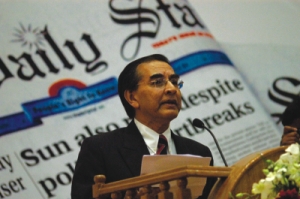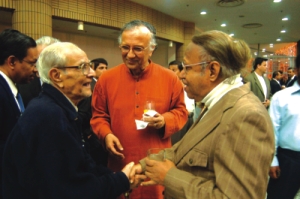

Why Bangladesh needs a free media
Mahfuz Anam
Why does Bangladesh needs a free media? The answer is very simple. Neither will survive without the other. Bangladesh as we know it, as we want it, as our Liberation Martyrs wanted it, will never be possible without a free media to protect and promote people's rights. Conversely, a free media cannot survive without a democratic Bangladesh to protect it. They are two sides of the same coin and they will shine or fade away, do or die, together.
Bangladesh needs a free media to be its promised self: to strengthen democracy, human rights, bring about good governance, protect cultural diversity, and build a multi-religious multi-ethnic and tolerant society.
It needs a free media to be an integral part of the 21st century world.
 It needs a free media to provide that essential intellectual environment of a competitive market place of ideas. Most of all, it needs a free media to fully realise the potential of the Bengali people. Many of our policy makers are yet to realise that they cannot create a free market economy without a free market-place of ideas. There cannot be any competitiveness in any sphere of life if there is no competitiveness of the mind, and freedom is the basis of such competitiveness.
It needs a free media to provide that essential intellectual environment of a competitive market place of ideas. Most of all, it needs a free media to fully realise the potential of the Bengali people. Many of our policy makers are yet to realise that they cannot create a free market economy without a free market-place of ideas. There cannot be any competitiveness in any sphere of life if there is no competitiveness of the mind, and freedom is the basis of such competitiveness.
The future of Bangladesh depends on how we can strengthen and give institutional shape to democracy. We hold this to be self-evident truth, that without a flourishing democracy there will be no flourishing Bangladesh. We have had our share of dictatorships and autocracies, and they simply do not work.
Without perhaps realising it fully, we have ushered in a competitive trend in Bangladesh. The interplay of ideas, plans, and their implementation in the quickest possible time have already made our nation move away from many of its older habits of procrastination and idling away of time in wishful thinking rather than in fruitful actions.
If we look at the future and hope to increase our pace of growth, the obvious needs are of better governance, lessening of corruption, reducing social and political conflicts, eradicating poverty and rich-poor divide, and modernising ourselves in every possible way. None of the above goals can be achieved without a free press.
Just as Amartya Sen was able to establish an inverse correlation between freedom and famine, so also there is an inverse correlation between a free press and repression, corruption, abuse of power, and non-accountable governance. If we look around the world, we can definitely say that countries having relatively less corruption and more freedom are all those that enjoy a high degree of free media.
Bangladesh today stands at the threshold of a grand opportunity. If we take the correct decisions we can, I firmly believe, surprise the world. Today two Bangladesh exist simultaneously -- a "regenerative" Bangladesh (whose most famous symbol is tonight's main speaker), and another "degenerative" Bangladesh (evidenced by widespread corruption). We have no doubt that the "regenerative Bangladesh" will win. But how quickly, is the question? There are signs all over the place that the "regenerative Bangladesh" is surely and certainly moving forward. But there are also some dark clouds of extremism on the horizon that we need to collective defeat and uproot.
In recent days, we have noticed that different platforms are being used to lash out against the media with sometimes false and very often distorted versions of events. Attempts are afoot to use quasi-judicial bodies to harness the press. While people in Bangladesh are too politically conscience to heed such falsehood, yet there is a need for us to reiterate why Bangladesh needs a free media.
We have no hesitation in asserting that whatever gains of democracy we have been able to enjoy over the last fifteen years it was fundamentally due to vigilant role the free and independent media. With everything remaining the same, Bangladesh would have been in far worse shape but for the presence of such a vigorous mass media.
With our readers behind us, we have come a long way. After 15 years, we feel, we can talk about "The Daily Star Brand," whose main feature is professionalism. Today, people know what to expect from us. They know we will be circumspect and fair, decent and conscientious, tough and determined, but above all, truthful and accurate. Feelings might be hurt, pride ruffled, but at the end, it is the nation that will be served.
As we enter the sixteenth year of our existence, some tough choices stare us in the face. When and how will our leaders rise above their parties and think of the nation as a whole? When will destructive politics be replaced by mutual engagement and shared vision? When will our poor, the disinherited, the marginalised, the malnourished, the illiterate, and the oppressed get their minimum share, when at last will we will stop being self-destructive?
The 21st century is one of immense opportunity. We at The Daily Star promise to bring the latest information about all of them to our readers' doorstep. Your favourite paper will work for a Bangladesh in which people will get a good education, healthcare, productive jobs -- and mass poverty will be a thing of the past. These are your dreams as they are ours. You have tested us over the last 15 years and have found us to be trustworthy. We promise to build on that trust.
they are ours. You have tested us over the last 15 years and have found us to be trustworthy. We promise to build on that trust.
We promise to be by your side as you struggle to establish accountability and transparency in government, build a responsible opposition, set aside hartals and parliament boycott as political weapons, hit out at the arrogance of governments that try throttle peaceful public dissent and marginalise the opposition.
We will be by your side as you bring decency back into the mainstream of public discourse and interaction.
Simply put, we will be by your side, and together we will build a modern, democratic, and economically growing Bangladesh. That is our promise.